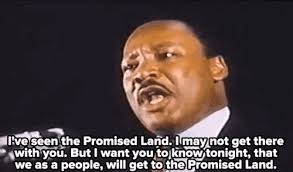(ThyBlackMan.com) On the night before his brutal and untimely death, Dr. Martin Luther King, Jr. spoke of the Promise Land. He told of his visit to “the mountaintop” to view it and said emphatically that “we as a people” would get there. Now, fifty years later, I wonder are we closer or further away and what the Promise Land would look like when we have finally arrived.
A survey of the American landscape today shows three distinctly different clusters of communities. The Economic Innovation Group classifies them as Prosperous, Muddling Along and Distressed. In their study Diverging Fates: Which Communities are Claiming the New Jobs and Business in the 21st Century, they analyze zip code data to look at which communities are thriving versus those that are distressed coming out of the Great Recession. The “Prosperous” are those top 10% of zip codes, home to 41 million people, that are  thriving and have experienced the overwhelming majority of net job growth since 2010. The “Muddling Along” zip codes are the middle 20% that are experiencing varying degrees of success but fall below the top group. The “Distressed” zip codes, home to 52 million people, are characterized by vanishing jobs, high poverty, low educational attainment and depressed real estate markets. Other findings from the report:
thriving and have experienced the overwhelming majority of net job growth since 2010. The “Muddling Along” zip codes are the middle 20% that are experiencing varying degrees of success but fall below the top group. The “Distressed” zip codes, home to 52 million people, are characterized by vanishing jobs, high poverty, low educational attainment and depressed real estate markets. Other findings from the report:
- The bottom 10% of all zip codes are concentrated in Appalachia, the southeast and rural areas of the southwest;
- Minorities are disproportionately concentrated in the most distressed communities; and
- Similarly situated zip codes tend to cluster – prosperous with prosperous and distressed with distressed.
Another interesting finding is that prosperous zip codes are found in every state, belying the widely held myth that those getting ahead in the 21st century global economy are only to be found on the east and west coasts.
So, back to the discussion of the Promise Land. Where is it? What does it look like? Is it only measured by material wealth or are there other factors to weigh? And, how do we get there from where we are now? I would also ask, is it a physical place at all, or is it a condition, a state of mind, where all people are seen and treated according to “the content of their character”?
When Alice was lost in Wonderland she asked for directions. Asked for the place she was trying to find, she responded that she didn’t know. Whereupon she was told it didn’t make any difference then what direction she went in. That seems to be the place we find ourselves in now. If we can’t define the Promise Land, how will we know when we get there, or even where there is?
King was our Moses. He led us out of legal segregation and, with his prophetic pronouncement on the eve of his death, he told us that “we as a people [would] get to the Promise Land.” But he was killed before he could articulate what or where the Promise Land was, and no Joshua has since come forward to lead us there. So we have been “wandering in the wilderness” of unemployment, low educational attainment and deteriorated housing. Yet many of us seem to have made it to the Promise Land of elite universities, good paying jobs and gated communities; only to be confronted by the police questioning if we belong there.
Maybe the Promise Land is like the kingdom of heaven was described: it lies within. Perhaps we will have arrived at the Promise Land when we each have full confidence in our ability to control our own fate. When we value things that are important, like education, more than that new pair of Yeezys. If the Promise Land is a place, maybe we have to do what our parents and grandparents did before us when they became part of the “Great Migration”, leaving the south for a new life with better opportunities elsewhere.
One thing is for sure, unless we know where we’re going, we’ll never get there.
Staff Writer; Harry Sewell

















The promised land was defined by the 13th,14th, and 15th Amendments to the U.S. Constitution. Life as free citizens in America is the promised land. King, the metaphoric Moses did not cross over into this new land with us. We have many metaphoric Joshua’s who continue to scout out this new land and has perceived that this new land is seemingly filled with people who make Joshua look like an ant compared to them, but unlike Moses’Joshua,our African American Joshuas aren’t willing to apply their numerous acquired assets like being humanized and enlightened through integration, education,sophisticated technology and the right to vote to help bring about a more perfect union. African American Joshuas are increasingly learning that their Ark of the Covenant is thought, and that The promised land is a concept of freedom that requires maintenance by all.